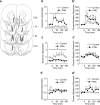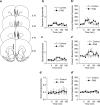Prenatal stress enhances responsiveness to cocaine
- PMID: 17487224
- PMCID: PMC2747653
- DOI: 10.1038/sj.npp.1301447
Prenatal stress enhances responsiveness to cocaine
Abstract
Early environmental events have profound influences on a wide range of adult behavior. In the current study, we assessed the influence of maternal stress during gestation on psychostimulant and neurochemical responsiveness to cocaine, cocaine self-administration, and reinstatement of cocaine-seeking in adult offspring. Pregnant, female Sprague-Dawley rats were subjected to either no treatment or to restraint stress three times per day for the last 7 days of gestation and cocaine-related behavior was assessed in offspring at 10 weeks of age. Relative to controls, a noncontingent cocaine injection elevated locomotor activity as well as nucleus accumbens levels of extracellular dopamine and glutamate to a greater extent in both cocaine-naive and cocaine-experienced prenatal stress (PNS) rats and elevated prefrontal cortex dopamine in cocaine-experienced PNS rats. To assess the impact of PNS on cocaine addiction-related behavior, rats were trained to lever press for intravenous (i.v.) infusions of cocaine (0.25, 0.5, or 1 mg/kg/infusion), with each infusion paired with a light+tone-conditioned stimulus. Lever-pressing was extinguished and cocaine-seeking reinstated by re-exposure to the conditioned cues or by intraperitoneal cocaine-priming injections (5 or 10 mg/kg). PNS elevated active lever responding both during extinction and cocaine-primed reinstatement, but not during self-administration or conditioned-cued reinstatement. PNS also did not alter intake during self-administration. These findings demonstrate that PNS produces enduring nervous system alterations that increase the psychomotor stimulant, motivational, and neurochemical responsiveness to noncontingent cocaine. Thus, early environmental factors contribute to an individual's initial responsiveness to cocaine and propensity to relapse to cocaine-seeking.
Figures








References
-
- Alonso SJ, Navarro E, Rodriguez M. Permanent dopaminergic alterations in then accumbens after prenatal stress. Pharmacol Biochem Behav. 1994;49:353–358. - PubMed
-
- Anderson SM, Bari AA, Pierce RC. Administration of the D1-like dopamine receptor antagonist SCH-23390 into the medial nucleus accumbens shell attenuates cocaine priming-induced reinstatement of drug-seeking behavior in rats. Psychopharmacology. 2003;168:132–138. - PubMed
-
- Anderson SM, Pierce RC. Cocaine-induced alterations in dopamine receptor signaling: implications for reinforcement and reinstatement. Pharmacol Ther. 2005;106:389–403. - PubMed
-
- Anderson SM, Schmidt HD, Pierce RC. Administration of the D2 dopamine receptor antagonist sulpiride into the shell, but not the core, of the nucleus accumbens attenuates cocaine priming-induced reinstatement of drug seeking. Neuropsychopharmacology. 2006;31:1452–1461. - PubMed
-
- Bachtell RK, Whisler K, Karanian D, Self DW. Effects of intra-nucleus accumbens shell administration of dopamine agonists and antagonists on cocaine-taking and cocaine-seeking behaviors in the rat. Psychopharmacology. 2005;183:41–53. - PubMed
Publication types
MeSH terms
Substances
Grants and funding
LinkOut - more resources
Full Text Sources
Medical

